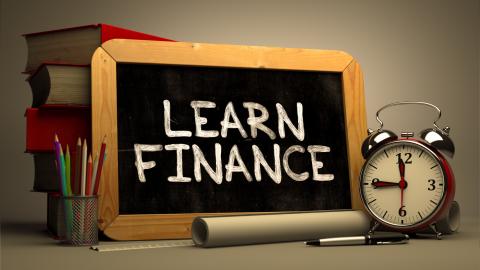The Hidden Costs of Ignorance: How a Lack of Financial Knowledge Can Hurt You
Apr 24,2023
Did you know nearly 8 in 10 students graduate with a debt load of less than $30,000? Graduating with tens of thousands of dollars in debt isn't ideal.
If someone graduates from college with debt and then goes on to make ill-advised financial decisions, they can end up in a major financial crisis.
Do you want to wind up with a financial albatross around your neck, or would you rather increase your financial literacy and build a strong financial future?
Keep reading to find out how a lack of financial knowledge can harm you.
Budgeting: Live Within Your Means
Overspending is one way that people can get themselves into big trouble. That's one reason why you must start budgeting right away. It's one of those things that people pay lip service to but seldom do consistently.
When you budget, you'll know how much you have to spend, how much you can save, and more. Keeping track of how much money comes in and how much money goes out will also allow you to make changes as required.
Were you aware that a mere 32% of U.S. households create a monthly budget? Meanwhile, 38% of people who've gone to college budget regularly compared to 26% of people who have a high school diploma or less.
So, by simply going to college, you'll increase your odds of budgeting. And of those who do budget, 70% set aside time weekly to check their spending.
If you're not budgeting, you should start doing so. It's hard to know how you're doing and what you can do better if you're not tracking what you're doing.
Are you unsure how to budget? There are lots of resources that'll get you up and running in no time. Check out this Consumer.gov resource that explains what it is, what to know, and what to do.
Refrain from allowing a lack of financial knowledge to get you into a proverbial hole.
Saving: Hope for the Best, Plan for the Worst
How much are you saving? A better question might be -- are you saving enough? According to the Teachers Insurance and Annuity Association of America, you should follow the 50/30/20 rule of thumb.
Are you familiar with this general saving principle? It's broken down as follows:
- 50% of your income should be used for necessities
- 30% of your income should be used for discretionary items
- 20% of your income should go toward savings
That's just a rule of thumb, so your specific percentage breakdown might differ. But it goes without saying that you need to save a portion of your income. Set up automatic withdrawals so that it works like clockwork.
If you're not saving, every problem will seem like a financial crisis. You'll likely use a credit card and rack up more debt. Saving money regularly will give you the financial flexibility to address issues.
The good news is that many financial service institutions offer savings accounts. Refrain from assuming the accounts you have are the best for you. Look for banks that offer high-interest savings account options.
When you save money monthly, bi-weekly, or weekly, you can hope for the best but be prepared for the worst.
Rainy Day Fund: Rain Will Come
Do you have an emergency fund? In addition to saving for specific goals or for general purposes, you need to have an account for emergencies. A dream vacation or a cool car to drive around on weekends isn't an emergency.
It's what you tap into if you're laid off and have no income, if your roof starts to leak and needs to be replaced, or if your daily driver needs an engine repair. An emergency fund, or rainy day fund, means you won't have to panic.
According to one source, only around one in four people -- 26% -- say they had more money in emergency savings in January 2023 than they did in January 2022.
Meanwhile, 39% say they have less, and one in four people have around the same savings tally as they did in 2022.
An emergency fund is essential because emergencies will materialize. Your pet might need an emergency procedure, your only vehicle might need a new transmission, or your plumbing system might need an overhaul.
You'll bring untold misery upon yourself if you're unable to meet these challenges.
But how much money should be in your rainy day fund? You should strive to save three to six months' worth of expenses in such an account.
Credit Cards: Don't Abuse Them
If you want to keep your personal finances in good shape, be wary of credit cards. They're not dangerous in and of themselves. It's how you use them that can create major issues.
Were you aware that the average person in America has $5,221 in credit card debt? That national total in credit card debt comes in at $841 billion. America has a big problem when it comes to racking up debt they struggle to pay back.
Getting ahead is hard when you're drowning in credit card debt. And that debt can climb steadily since interest rates are so high. All it'll take is a few missed payments for a small debt load to become a heavy albatross around your neck.
The general rule of thumb is that you shouldn't put more on your credit card than you can afford to pay back before any interest is owed on that amount.
If you can control yourself, stop using your credit card. You can dig yourself too big a hole if you use it without good judgment. The last thing you want is be become overwhelmed by payments you can't keep up with.
Be Patient: Self-Denial Is a Must
Are you one of those people who doesn't want to wait for what you want?
One of the best things you can learn to do is to acknowledge you can't afford something. You're better off waiting until you're financially ready to buy what you want.
Is it worth going into debt to get what you want? Sometimes you might need something right away. You'll want to do it as responsibly as you can if that's the case. But most times, a little self-denial and patience are what's needed.
Don't fall for the idea that you must have what you want immediately. It might make more sense to have delayed gratification, where you simply wait a while before you get what you want.
Sometimes, the solution to your issues is to boost your income. You could work more hours, find a higher-paying job, or take on one or more side hustles. Making more will reduce your reliance on credit cards.
Save for What You Want: It's Worth Doing
Instead of going into debt unnecessarily, start saving toward your goals.
It's nice to get scholarships and bursaries for college. But if you don't secure them, there's nothing wrong with saving so that you can pay your tuition.
Getting a part-time job while in college is another way to pay for your education.
If you do need to apply for loans to pay for school, do your homework to find the best financial aid options.
The same principle applies if you want to buy a car, go on vacation, arrange a destination wedding, purchase a home, or do anything else with a tangible price tag. Instead of going into debt, try to save toward what you want.
If you grew up in a home where the adults bought everything by credit card or financing arrangements, you might think that taking on debt is normal. But this sort of financial ignorance can leave you deep in debt.
Recognize the value of money. And prioritize what's important. Don't lease a new car if you're already struggling with your other monthly bills. It might be tempting to do so, but it makes no sense to buy something you can't afford.
Get the Financial Knowledge You Need
If you weren't taught about good personal finance principles as a kid, it's important to seek this knowledge as you advance through life.
Learning and putting into practice good financial knowledge will help you avoid the types of pitfalls that jeopardize the financial stability of many people.
Are you interested in learning more about personal finance and how to get ahead rather than fall behind? At Honor Society, we have many useful resources to educate yourself on relevant topics.
Check out our career finance section for more useful personal finance articles. You can also learn more about other interesting topics like scholarships, financial aid, and internships





